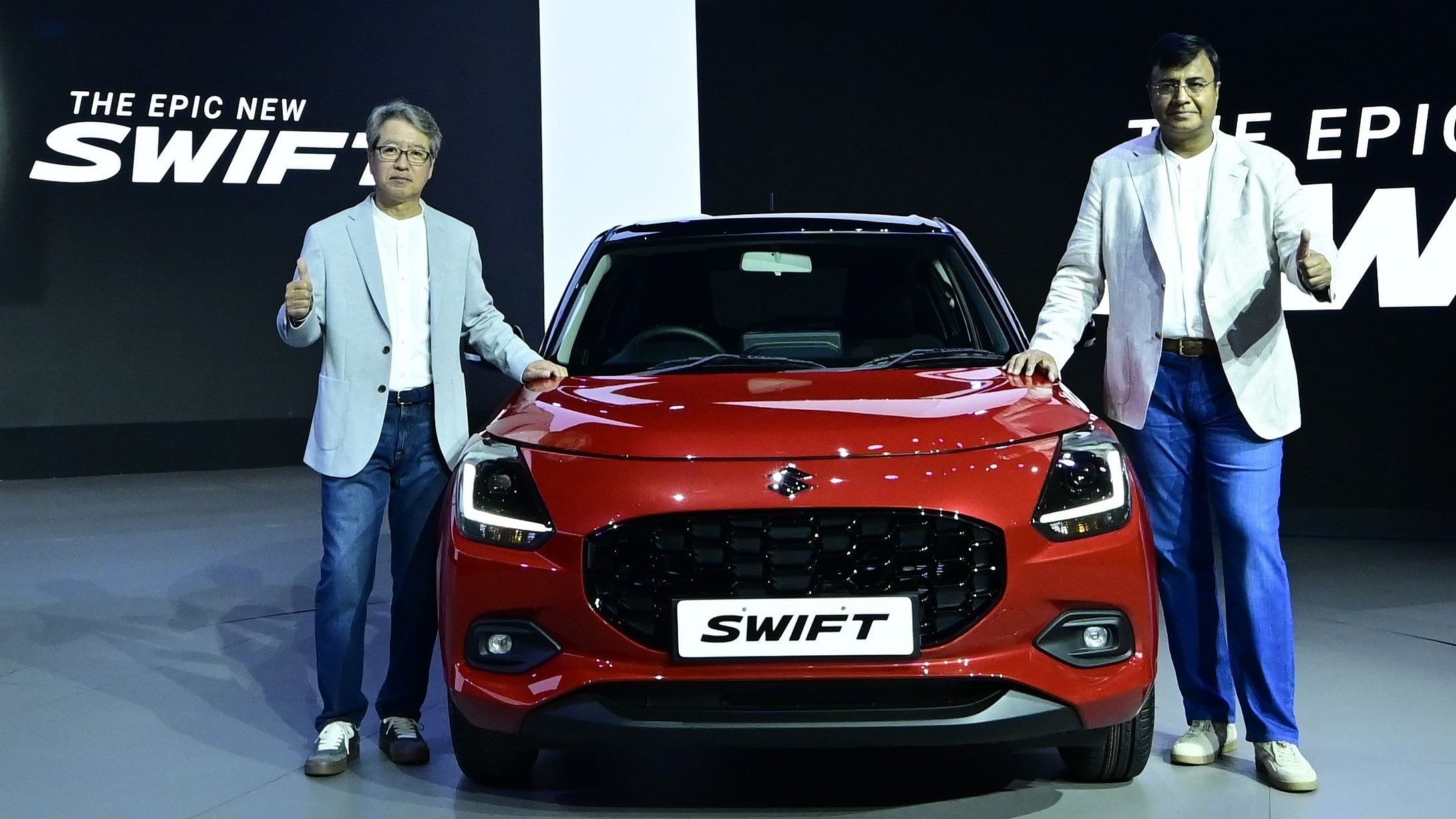
Maruti Suzuki MD & CEO Hisashi Takeuchi (L) with Marketing & Sales Senior Executive Officer Partho Banerjee (R).
Bengaluru: Maruti Suzuki India Ltd (MSIL) was late to the SUV ‘party’, but has now made up ground. In the last financial year (FY24), around 50% of all passenger four-wheeler sales were sports utility vehicles. And the company says it sold more SUVs than any of its competitors with the exception of Mahindra.
“The contribution of SUVs to our total sales in FY24 was close to 21%. Despite that we were number two in terms of volumes. So our endeavour will be to aim for number one in FY25,” said Partho Banerjee, Senior Executive Officer, Marketing & Sales.
Banerjee and Rahul Bharti, Executive Officer, Corporate Affairs, were speaking with DH on the sidelines of media test drives for the new generation of the popular Swift.
It may seem counterintuitive to be launching a new hatchback at a time when sales in the small car segment have plummeted. However, executives at India’s largest car manufacturer forecast a recovery for the segment.
“Now you are seeing green shoots, sales of two-wheelers are recovering. So, one can expect within two or three years that will translate into hatchback sales as well,” Bharti said.
The perceived wisdom is this: As people move from lower income to middle income category, the current generation of motorcycle and scooter owners will become first time car owners in the medium-term, thus leading to an increase in small car sales. There is now a steady recovery in rural demand, which had lagged urban demand since the pandemic. If the forecast of a normal monsoon comes true, that will have a positive impact on sales, the executives said. About 47% of the company’s sales come from rural India.
As the previous generation of small car owners moved on to SUVs with a rise in income, there was a gap. Those in the middle and lower-middle income bracket did not see their incomes rise due to the Covid-induced economic slowdown. This, coupled with an increase in prices of hatchbacks due to stricter safety and environmental regulations, led to a dip in the entry-level category.
“Affordability is a challenge. A person may be able to reach a certain income level. And suddenly I raise prices. So it will take time for them to come to that level,” Banerjee said.
For FY25, MSIL sees a single digit year-on-year growth due to a high base and also the elections, when economic activity slows down briefly. “People are holding back purchase decisions. Yes, maybe after June sales will pick up,” Banerjee said.
Expansion plans
Bharti said the company’s ongoing expansion plans may lead to direct and indirect employment opportunities for around 1-1.2 lakh people.
Additional capacity of 1 lakh cars is being added to MSIL’s Manesar plant, which currently has a capacity of 22 lakh per annum.
“We are putting up the Kharkoda (Haryana) plant, which will have a final production capacity of 10 lakh cars. We have the Gujarat one (acquired from parent Suzuki) which has 7.5 lakh capacity. We have announced Rs 3,200 crore investment for a fourth assembly line which will be for electric vehicles,” Bharti said.
The company is scouting for a second plant in Gujarat, which is also expected to eventually produce 10 lakh cars per year, following which it could also look at sites in the southern states, Bharti added. A prerequisite is proximity to ports to meet export demand.
MSIL’s plans to launch its first electric vehicle this year, and put it up for sale in FY26, are on track. Banerjee says it will offer a 550 kilometre range on a 60 kilowatt/hour battery, and the price point is yet to be determined.
Even then, MSIL is not putting all its proverbial eggs in the EV basket. CNG and hybrid models are part of the company’s range, and it is also experimenting with biofuels.
“In FY24, of our total sales, every fourth car was a CNG car. This year, as more CNG stations come up, maybe we will go to one in every three. We feel that in India, if you want to be market leader, you need to provide all sorts of powertrain options to the customer,” Banerjee said.